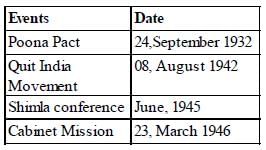SSC CGL Previous Year Questions: History - 2 - SSC CGL MCQ
20 Questions MCQ Test - SSC CGL Previous Year Questions: History - 2
Satara got annexed to East India Company by applying which policy? (SSC Stenographer 2018)
Who was the President of India during 1977-1982? (SSC Stenographer 2018)
In which state is the Bhimbetka caves which is famous for pre-historic rock paintings? (SSC Stenographer 2018)
Vedic religion was also known as __________. (SSC Stenographer 2018)
The famous book written by the scholar Al-Biruni is ___. (SSC Stenographer 2018)
Which King gave titles like Muvendavelan, Araiyar etc. to rich land owner as a mark of respect? (SSC Stenographer 2018)
Who was the son of Chandra gupta Maurya? (SSC CGL 2017)
Which dynasty came to power in India after the Tughlaq dynasty? (SSC CGL 2017)
Who has built the Vijay Stambha (Tower of Victory) in Chittorgarh? (SSC CGL 2017)
Who raised the slogan "Swaraj is my birthright and I shall have it"? (SSC CGL 2017)
Which one is the correct chronological order of the following events? (SSC CGL 2017)
(I) Quit India Movement
(II) Shimla Conference
(III) Poona Pact
(IV) Cabinet Mission
In 1917, which movement was launched by Mahatma Gandhi from Champaran? (SSC CGL 2017)
Who amongst the following was the successor of Sikh Guru Har Krishna? (SSC CGL 2017)
Lord Cornwallis is known for __________. (SSC CGL 2017)
Chandragupta Maurya was an ardent follower of ________. (SSC CHSL 2017)
The First Battle of Panipat in 1526 was fought between the Lodi Empire and __________. (SSC CHSL 2017)
Which fort is also known as the Golden Fort? (SSC CHSL 2017)
In which year East India Company was ceased to work and India was completely undertaken by British Govt.?
(SSC Subinspecter 2017)
At which location, a sculptor of chariot of Harappan time was found? (SSC Subinspecter 2017)
First Satyagrah started from Champaran for opposing the cultivation of ________. (SSC Subinspecter 2017)















